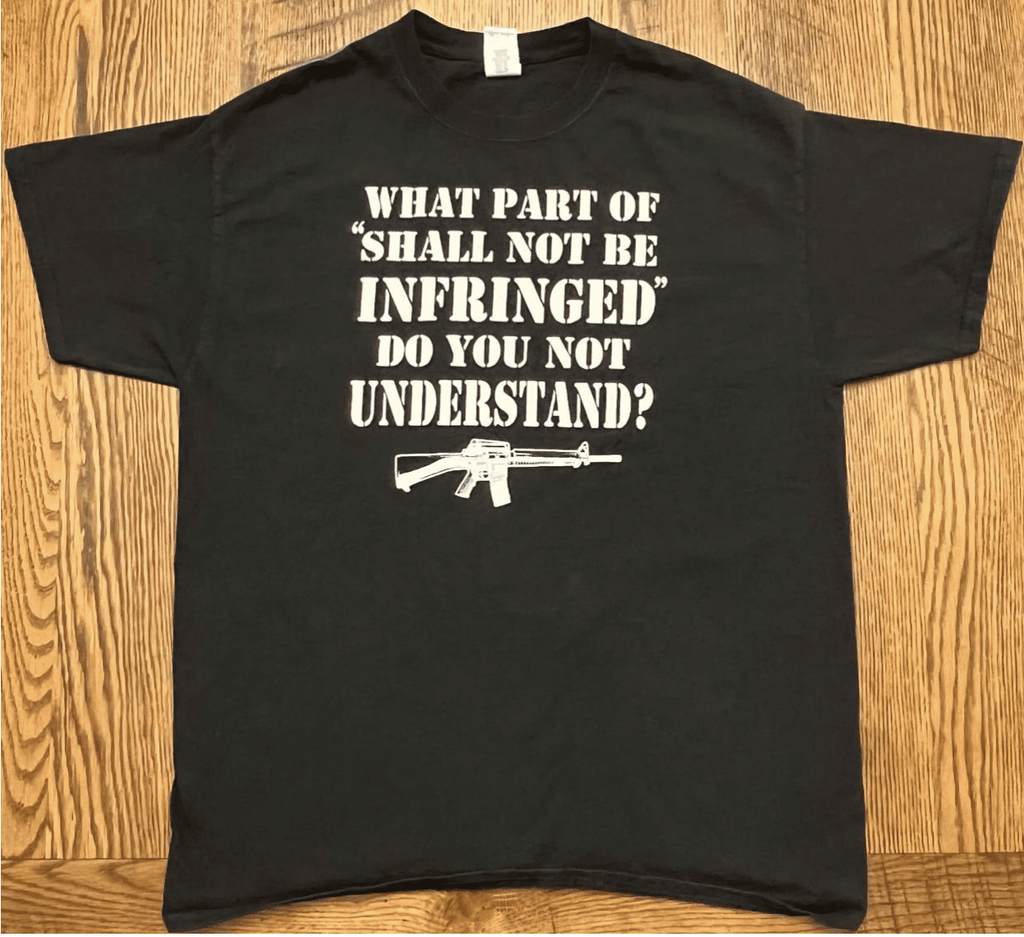An Iowa high schooler has filed a federal lawsuit alleging that her school district and a civics teacher violated her First Amendment rights by suspending her for wearing a pro-Second Amendment t-shirt to class; a case that could one day have far-reaching implications for students across the country.
In the complaint, which is the topic of today’s Bearing Arms’ Cam & Co, the student (identified by her initials A.B.) alleges that just two days after discussing students’ rights to free speech in class, teacher Thomas Griffin “removed her from class and suspended her” for wearing a t-shirt promoting the Second Amendment, claiming it was “inappropriate”.
Griffin told his students that, although they had some right to free speech, that right was “extremely limited” when the students stepped on school property. Griffin told his students that their teacher (in this case, him) would decide what was acceptable speech in the classroom. And with respect to clothing—which was at the very core of the Tinker case—Griffin told his students that he would not allow students to wear any clothing that depicts guns, alcohol, or any other “inappropriate material.”
A.B. knew that Griffin was wrong about the scope of the First Amendment, so the next time she had Griffin’s government class, September 1, 2022, she wore a shirt to school that said “What part of ‘shall not be infringed’ do you not understand?” with a depiction of a rifle underneath it.
A.B. had worn the shirt to school before, with no complaints from students, teachers, or administrators. And A.B.’s brother, who graduated from Johnston High School in 2019, had worn the same shirt to school multiple times with no complaints.
Griffin, who teaches the Bill of Rights, knew that shirt was quoting the Second Amendment of the U.S. Constitution, and he knew it was a commentary on gun control efforts. Nevertheless, he claimed that the shirt violated the school’s dress code and he removed A.B. from the classroom, sending her to the school administration office.
A.B. told Griffin she had a right to wear the shirt, which was not causing any disruption in the class—other than any disruption Griffin himself created by removing A.B. from the classroom. But Griffin said she was wrong about the First Amendment and that the administration would back him up.
As you can see, there are no depictions of violence on the shirt worn by A.B., but the school administration did indeed originally stand by Griffin’s actions, suspending her after she refused to change her shirt in order to return to class.

The lawsuit alleges that later that evening, however, A.B.’s mom Janet Bristow received a call from the school district’s superintendent to apologize for their actions, as well as a similar mea culpa from Chris Billings, the Executive Director of School Leadership.
That evening, Johnston Community School District Superintendent Laura Kacer called Bristow to apologize.
Shortly after Kacer’s phone call, Billings emailed A.B. to apologize. He stated that he “now recognize[s] that this is considered political speech.”
Bristow asked the school officials that Griffin also apologize to A.B. and address the students in his class, (the students knew A.B. had been removed from the classroom because of her shirt) and inform them that he was wrong in claiming that A.B.’s shirt was not protected speech.
According to the lawsuit, Griffin did not apologize to A.B. or issue any corrective statement to students. Additionally, despite the district’s apology the suspension remains in A.B.’s student file.
A.B.’s attorneys say the district’s actions are in direct violation of the Supreme Court’s decision in Tinker v. Des Moines, a seminal free-speech case that also originated in Iowa in the 1960s when then-high schooler Mary Beth Tinker sued after she was disciplined for wearing a black armband in protest of the Vietnam War. In its decision, the Court made it clear that students don’t “shed their constitutional rights to freedom of speech or expression at the schoolhouse gate,” and as A.B.’s attorneys note, established the precedent that unless the speech in question causes “substantial disruption, promotes illegal conduct, or is lewd, indecent, or vulgar, it is constitutionally protected.”
Interestingly, when the Des Moines Register reached out to Tinker and other free speech advocates like UCLA law professor Eugene Volokh and the Foundation for Individual Rights in Education’s Adam Steinbaugh for comment on the lawsuit, she was the only one who sided with the school district.
“Under (the Tinker decision), there is ample room for the censorship of messages that impinge on the rights of others, the often-overlooked second part of the Tinker test,” Tinker said in an email, pointing to the Supreme Court’s holding that “conduct by the student … which for any reason … involves substantial disorder or invasion of the rights of others is, of course, not immunized by the constitutional guarantee of freedom of speech.“Tinker said she believes wearing a shirt to school depicting a gun might constitute such an invasion of the rights of others, not just of other students, but of teachers, staff and visitors to the school.
Tinker, now a pediatric nurse and speech activist, said that beyond the free speech question, the dispute should be an opportunity for the district to address controversies about firearms.“What if the Johnston school district took this as a teaching moment to promote dialogue on gun laws, gun violence statistics, etc.?” she asked. “Iowa trauma nurses who, like me, have cared for so many pediatric victims of gun violence, might take part as well.”
“The ‘invasion of the rights of others’ is not the right to be free of words or views that you dislike. It’s more a right to be free of harassment or discriminatory conduct or threats,” he said. “I understand the image of a gun might sometimes be unsettling to people, but it’s far from a threat.”









Join the conversation as a VIP Member